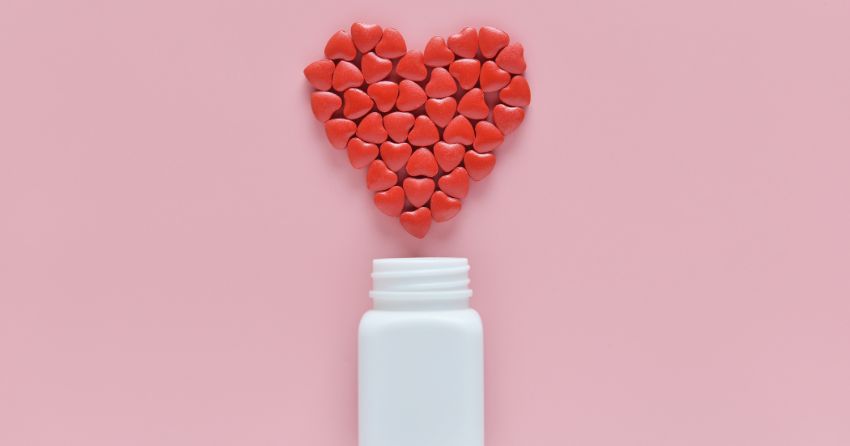From the Antarctic to the Mediterranean: Maintaining Healthy Hearts With Arctic Krill Oil, Olive Leaf Extract and Curcumin

Many people have hearts on their minds in February—and not just because of Cupid and Valentine’s Day. February is American Heart Month—four weeks dedicated to increasing awareness of heart health and the prevention of cardiovascular conditions.
Several lifestyle choices are known to support heart health—like regular exercise, eating healthy, not smoking and managing stress, to name a few. However, adding certain supplements to your daily routine can also help to harness a healthier heart, including Arctic krill oil, olive leaf extract and curcumin—let’s take a closer look at these three heart helpers.
The Advantages of Arctic Krill Oil
It’s now well-known that omega-3 fats are beneficial for cardiovascular health. But while the most common way to get these healthy fats is through fish oil supplements, there may be a better option—Arctic Select Krill Oil, sourced from sustainably harvested krill in the chilly waters of the Antarctic.
While fish oil supplements utilize omega-3s derived from triglycerides, krill oil contains omega-3 fats (both eicosapentaenoic acid [EPA] and docosahexaenoic acid [DHA]) in the form of phospholipids—fatty compounds that are essential for cell membrane integrity.
Phospholipids consist of a water-loving (hydrophilic) “head” and a water-hating (hydrophobic) “tail” and have a unique structure that allows them to be better absorbed and readily accepted by our cells. For these reasons, phospholipid-bound omega-3s in krill oil may be better absorbed than triglyceride-bound fish oil. This was seen in research from 2018, which found that supplemental krill oil led to similar increases in plasma EPA concentrations as fish oil—despite the lower percentage of EPA found in krill oil—indicating that krill oil may be more effectively absorbed into the blood.
Krill oil also has a leg up on fish oil due to its high astaxanthin content. Astaxanthin is a pigmented compound known as a carotenoid, giving krill and the animals that eat krill—salmon, shrimp, lobster and even flamingos—their pink or red coloring.

Astaxanthin has exceptionally high antioxidant activity due to its unique structure that remains both inside and outside of the cell membrane. This allows it to inhibit fat oxidation and scavenge for inflammatory reactive oxygen species (ROS) from all sides. A buildup of ROS causes oxidative stress, which damages cells and contributes to aging and poor cardiovascular function.
Astaxanthin also protects the function of our mitochondria—the energy-producing centers of our cells that tend to decline in quality with age. As dysfunctional mitochondria are thought to be a significant contributor to declining heart function, maintaining the quality of these cellular energy machines with astaxanthin from krill oil may be one way to support cardiovascular health with age.
Outstanding Olive Leaf Extract
Olives and olive oil are a significant part of the heart-healthy Mediterranean diet for a reason. These nutritious foods—and supplemental forms of them, like Olive Leaf Extract—are loaded with antioxidant compounds.
One such compound is oleuropein, which is concentrated in the olive leaf. Oleuropein has potent antioxidant properties and supports a healthier inflammatory response throughout the body—especially in the heart. As an antioxidant, oleuropein is thought to prevent the oxidation of LDL (“bad”) cholesterol, which can severely damage the walls of arteries. Research has shown that olive leaf extract may lower LDL cholesterol levels, blood pressure and inflammatory markers in the blood.
Olive leaf extract also contains hydroxytyrosol, another antioxidant compound. Some of the noted cardiovascular effects of hydroxytyrosol include protecting cholesterol from oxidative damage, maintaining normal cholesterol concentrations and blood pressure and supporting healthier cardiac inflammatory responses.
Cardioprotective Curcumin
Curcumin is a plant compound known as a phytochemical. This compound is part of the curcuminoid family found in turmeric—a root most known for its golden hue and essentiality in Indian cuisine.

One of curcumin’s most well-known benefits is its ability to support a healthy inflammatory response—which is often dysregulated in people with cardiovascular conditions. Curcumin also fights oxidative stress and a buildup of reactive oxygen species that can damage the heart, and helps to maintain healthy blood sugar control and blood lipid levels. Further, curcumin can delay cellular senescence in the heart—the permanent cellular growth arrest that leads to inflammatory “zombie cells” and contributes to aging.
However, curcumin has notoriously low bioavailability on its own. Therefore, many supplements utilize absorption-promoting methods, like Optimized Curcumin Longvida®—a proprietary technology that has been found to be 285 times more bioavailable than regular curcumin.
Key Takeaways
- Three supplements that may support heart health after age 40 include Arctic krill oil, olive leaf extract and curcumin.
- Krill oil is loaded with the antioxidant-rich astaxanthin and bioavailable forms of omega-3 fatty acids—plus, it's more sustainable than most fish oils.
- Olive leaf extract contains many beneficial cardioprotective compounds, including oleuropein and hydroxytyrosol.
- Curcumin—the primary bioactive compound in turmeric—is a potent antioxidant and supports healthier inflammatory responses and the survival of healthy cardiac cells.
References:
Cox FF, Misiou A, Vierkant A, et al. Protective Effects of Curcumin in Cardiovascular Diseases-Impact on Oxidative Stress and Mitochondria. Cells. 2022;11(3):342. Published 2022 Jan 20. doi:10.3390/cells11030342
Ismail MA, Norhayati MN, Mohamad N. Olive leaf extract effect on cardiometabolic profile among adults with prehypertension and hypertension: a systematic review and meta-analysis. PeerJ. 2021;9:e11173. Published 2021 Apr 7. doi:10.7717/peerj.11173
Romani A, Ieri F, Urciuoli S, et al. Health Effects of Phenolic Compounds Found in Extra-Virgin Olive Oil, By-Products, and Leaf of Olea europaea L. Nutrients. 2019;11(8):1776. Published 2019 Aug 1. doi:10.3390/nu11081776
Sung HH, Sinclair AJ, Lewandowski PA, Su XQ. Postprandial long-chain n-3 polyunsaturated fatty acid response to krill oil and fish oil consumption in healthy women: a randomised controlled, single-dose, crossover study. Asia Pac J Clin Nutr. 2018;27(1):148-157. doi:10.6133/apjcn.092017.03
Wen C, Jiang M, Huang W, Liu S. Antarctic Krill Oil Attenuates Oxidative Stress via the KEAP1-NRF2 Signaling in Patients with Coronary Heart Disease. Evid Based Complement Alternat Med. 2020;2020:9534137. Published 2020 Oct 7. doi:10.1155/2020/9534137







